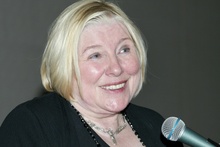Right - Author Fay Weldon. File photo / Nicola Topping
The British-born novelist, playwright and essayist spent her childhood in Christchurch. Then at 15, when her parents separated, she returned to Britain with her mother and sister. As a copywriter, she wrote the line, 'Vodka gets you drunker quicker.' The client rejected it. In 1967, she wrote The Fat Woman's Joke. She also wrote the first episode of the TV series Upstairs Downstairs. Weldon, 80, has just published her 33rd book, Habits of the House. She teaches creative writing and lives in Dorset.What is the first thing you think when someone says "New Zealand"?
I think of that road between the Coromandel and Auckland and the pohutukawas and the rocks. Sometimes I think I'd like to come back and live. But I'm 80, as you know, and it's so far away. I'm glad it's so far away because otherwise the world would be far too small. I think of the Christchurch cathedral. I do remember waiting outside the cathedral for a tram once and my knickers came down. I remember that with great aplomb, I simply stepped out and walked away from them.
How much of your writing started from a New Zealand germ rather than a literary germ?
I suppose most of my reading was English literature. There was a lot of Victorian literature being brought over. I spent my first 15 years in New Zealand. I don't know how I cannot have been influenced. It's the landscape. And there's a very New Zealand way of being. You didn't make a fuss. You didn't think too grandly of yourself.
You wrote the first episode of Upstairs Downstairs; your latest book is set in the 1800s. Why do you write about the past?
When I was a child I had a book called Mrs Beeton's Book of Household Management. It was a 1905 edition and it was so completely unusual and so unlike the 1930s - how you fold your napkins into swan shapes. It was fascinating. The parlour fire, the sweeping, the wonderful ritual. It was an insight into lives lived far away and long ago. Mrs Beeton's instructions were kindly and stern. It was an escape from all that was so bleak and practical.
Would writing courses or competitions have worked for you at the beginning?
I had no problems getting things out. I couldn't believe it that if I wrote something, people would publish it. I think working in advertising helped because it's all about persuading people with language.
Was your mother a major influence on your life and writing?
Enormous, as an influence. She was an extraordinary, intelligent, brave and difficult woman. She was a free thinker. A natural feminist. I don't think she felt imposed upon by anyone.
Full interview at the NZH.

No comments:
Post a Comment